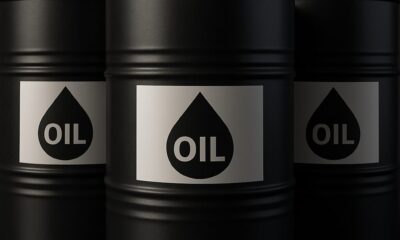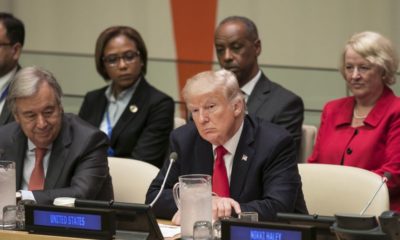Markets
Focus Shifts to Execution after OPEC Deal
Published
8 years agoon

- Focus Shifts to Execution after OPEC Deal
After an intensely negotiated meeting, the Organisation of Petroleum Exporting Countries (OPEC) decided to cut crude oil production amongst its member countries in a bid to support market rebalancing and shore up oil prices.
In reaching the agreement, OPEC reportedly stated that the global oil market had witnessed a serious challenge of imbalance and volatility pressured mainly from the supply side, which has also led to significant investment cuts in the oil industry.
This, the cartel noted, had a direct impact on offsetting the natural depletion of reservoirs and in ensuring security of supply to producers.
The current market conditions, it explained are counterproductive and damaging to both producers and consumers because it threatens the economies of producing nations, hinders critical industry investments, jeopardises energy security to meet growing world energy demand, as well as challenges oil market stability as a whole.
The cartel thus asked its members to lead in the market rebalancing effort, which in this regards saw to a number of production discounts agreed by members.
Within the deal, Algeria will have to shave off about 50,000 barrels per day (bpd) to now produce 1.039million barrel per day (mbpd), Angola will do 1.673mbpd from 1.715mbpd, Ecuador – 522,000bpd from 548,000bpd, Gabon – 193,000bpd from 202,000bpd, Iran – 3.797mbpd from 3.975mbpd, Iraq – 4.351mbpd from 4.561mbpd, and Kuwait – 2.707mbpd from 2.838mbpd.
Other members like Qatar will also do 618,000bpd from 648,000bpd, Saudi Arabia – 10.058mbpd from 10.544mbpd, United Arab Emirates (UAE) – 2.874mbpd from 3.013mbpd, and then Venezuela from 2.067mbpd down to 1.972mbpd.
Nigeria and Libya are however left out for their peculiar challenges, while Indonesia had suspended its membership of the cartel.
But whether their plan would be sustainable, depends largely on how its members firmly stick to the agreement they reached in Vienna, and this is more worrisome on reported accounts that they have not always done that in the past.
However, in a statement it published at the conclusion of the 171st Ministers’ meeting, the cartel indicated that it would shave off approximately 1.2 mbpd from its daily production volume to 32.5mbpd, a notch analysts said, was above the 1.1mbpd cut it had pledged it would do when it met in September at the International Energy Forum in Algiers.
Though expected to take effect from January 1, 2017, the sweetener in the deal, which perhaps elicited some excitements in the market was the fact that non-OPEC producers may also partake in the production cut by implementing an almost 600,000bpd production cut.
Russia which is expected to lead in this was reported to likely account for about 300,000bpd of that volume alone.
According to the OPEC statement, the cartel recognised that there was an ongoing reduction in the stock overhang, and so in line with the Algiers Accord decided to implement a new production target of 32.5mbpd, in order to accelerate the stock overhang drawdown and then bring the oil market rebalancing forward.
“The agreement will be effective from January 1, 2017. The conference also decided to establish a high-level monitoring committee, consisting of oil ministers, and assisted by the OPEC Secretariat, to monitor the implementation of the agreement.
“Member countries, in agreeing to this decision, confirmed their commitment to a stable and balanced oil market, with prices at levels that are suitable for both producers and consumers,” said the statement.
It added: “In line with recommendations from the high-level committee of the ‘Algiers Accord’, the conference also agreed to institutionalise a framework for cooperation between OPEC and non-OPEC producing countries on a regular and sustainable basis. The conference underscored the importance of other producing countries joining the agreement.”
From Talks to Action
As much as the accord would come into effect at the start of 2017 and then for last six months, with calls for an additional 600,000bpd reduction from non-OPEC suppliers expected to be observed, analysts however, indicated that the success of the cartel’s decision would now depend on how well it is able to execute it.
On the back of this, Bloomberg quoted the Energy Minister of Russia, Alexander Novak, to have said in Moscow that Russia would be willing to ensure the success of the deal and would contribute to the market rebalancing efforts.
Novak, according to Bloomberg, said Russia would cut production by as much as 300,000bpd but “conditional on its technical abilities.”
Similarly, other non-OPEC countries like Mexico would, as indicated by OPEC, be approached to get their buy-in in the deal, which Jeff Currie, an economist and the global head of commodities research at Goldman Sachs Group Inc. told Bloomberg are “incredibly appealing.”
Currie in his analyses stated that the main aim of the cuts was inventory normalisation, and his views were equally shared by Amrita Sen, who is the chief oil analyst at Energy Aspects Ltd.
According to Sen, the production cut was a wake-up call on OPEC’s cynics, who held the view that its decision perhaps had a minimal impact and could not really muster the force to rebalance the oil market.
“This should be a wake-up call for sceptics, who have argued the death of OPEC. The group wants to push inventories down,” Sen said.
While Nigeria and Libya are excused from the OPEC deal on account of both countries’ struggles to recover from previous outages, it was however reported that the cartel could hold another meeting on December 9 with non-OPEC members to firm up their commitment to the deal.
The cartel however indicated that there was a strong and common ground that continuous collaborative efforts among producers within and outside OPEC would complement the market in restoring a global oil demand and supply balance.
It also said it was committed to a stable market, mutual interests of producing nations, an efficient, economic and secure supply to consumers, and a fair return on invested capital of producers.
According to OPEC, countries participating in the deal had opted to do that on the principle of good faith, and through dialogue and cooperation to ensure there would be cohesive, credible, and effective action and implementation.
The decision, it also noted, would be without prejudice to future agreements, while Algeria, Kuwait, Venezuela, and two participating non-OPEC countries would closely monitor the implementation of and compliance with the agreement and report back for future actions.
The cartel also stressed that the agreement was reached following extensive consultations and understanding reached with key non-OPEC countries, thus indicating that it has perhaps marshalled out its strategy to ensure cooperation and compliance.
Comfortable at Mid-$50/b
Notwithstanding, Nigeria which was excused from the deal has said it would be comfortable with oil price levels at a mid-$50 per barrel range.
Shortly before the deal was reached, the Minister of State for Petroleum Resources, Dr. Ibe Kachikwu, in an interview with Bloomberg said Nigeria would be quite comfortable with the price of crude oil hovering at mid-$50 per barrel.
While indicating that the country’s production volume was gradually growing on account of limited disruption by militants in the Niger Delta region, Kachikwu however, said he was not sure when the current militancy affecting oil and gas production in the region would end, even though the federal government had reportedly made some progress in its attempts to resolve the issues.
He also said, if it rose to $60/b, he would consider it a favour to the country, but that the country would have to work to recover its volumes.
The minister equally maintained that for the country to enjoy the benefits of the OPEC deal, it would have to continue to work on its efforts to find a lasting solution to the militancy in the Delta and grow its production volumes for it.
“Mid $50: $54, $55, $56. If we have a Santa Claus day, then $60, but frankly we are looking to mid $50,” said Kachikwu, in response to a question on what level of oil price the country would consider comfortable.
“I think the Niger Delta issue is a major problem because you simply can’t get a final handle on it until it is resolved and you will never know when it is resolved.
“We have made a lot of progress on that; productions are up – 1.9 million barrel (mb), 1.95mb from the lows of 1.4mb. Militancy attacks are less, an average of one every month as opposed to five to six every week when it first started early in the year,” he explained.
Is the CEO and Founder of Investors King Limited. He is a seasoned foreign exchange research analyst and a published author on Yahoo Finance, Business Insider, Nasdaq, Entrepreneur.com, Investorplace, and other prominent platforms. With over two decades of experience in global financial markets, Olukoya is well-recognized in the industry.

You may like
-
Brent Falls Below $60 as Trump’s Tariffs Intensify Global Demand Shock
-
Brent Could Dip Below $40 as Trade Tensions and Supply Glut Mount—Goldman Sachs
-
Crude Oil Prices Sink to 2021 Lows as U.S.-China Trade War Escalates
-
Oil Extends Losses as Global Selloff Accelerates on Trump Trade Measures
-
Oil Prices Gain 1% as Trump Threatens Tariffs on Russian and Iranian Crude Buyers
-
Trump Warns Putin: Ceasefire or Face Global Oil Sanctions













